STAGE 8 // Glomfjord - Tjøtta
-
66°49'01.7"N 13°56'32.0"E
-
66.817133, 13.942213
-
Glomfjord - Tjøtta
Distance
-
Glomfjord - Tjøtta
-
Radius 100 km
-
256 km
Highlights
-
Saltfjellet National Park
-
Svartisen Glacier
-
Storglomvass Damm
-
Holmvass Damm


Saltfjellet–Svartisen National Park
About 15 km southeast of Glomfjord, at the end of the mountain road up to Glomfjellet you can find the massive Storglomvass Damm - the world's largest stone dam, on Storglomvatnet. The Storglomvass Dam holds over 3.5 billion cubic meters of water, enough to provide over 500 liters of water to each of the inhabitants of earth. You can park at the top of the hill overlooking the dam, and hike eastwards down to it.
Two large glaciers rest into the scenic environment of Saltfjellet–Svartisen National Park. If you have time, you can also take the road south from the parking area at Storglomvass to the Holmvass Damm, from where you can either continue on to the Svartisen Glacier in Holmvassdalen, or hike up into the hills for some great views over to Svartisen and the surrounding mountains - as always, everything is at your own risk, so take care!



Russian Prisoners of war built Nordlandsbanen
While you're in the area, you could head out onto the European Route E6 for a while and ride north along Saltfjellveien in Rana Municipality (66.5035743916301, 14.983728199817874) where you can find a memorial to Soviet prisoners of war that the Nazis used as forced labour to build the Polar Rail Line.
Sections of the Polar Line between Mo i Rana and just north of Fauske remain unused today, yet function as a living memorial in the landscape, a cultural monument that tells of the exploitation and humiliation of Soviet prisoners, and of the Nazis' ideals that Slavic peoples were Untermenschen, and destined to be slaves. Parts of the railway and the E6 through Nordland are built by prisoners of war from the Soviet Union and Yugoslavia. The prison camps lay in a row alongside the road.



Conflict infrastructure projects
Before World War II, there was no railway in this region. The roads were bad, inconsistent and dangerous. The German occupying forces saw that a continuous transport route on land was necessary for the fortification of Norway's north coast. They feared that an allied invasion could happen in Nordland, so the Germans laid out the course so that it would be difficult to attack. Hitler's aim was that the Polar Railway should run all the way to Kirkenes. After the war, the road was used as a "national road".
Photos
-
Dave O'Byrne
-
European Touring Route AS
Partners
Highlights
-
Saltfjellet
-
E6 Arctic Circle Center
-
E6 Soviet Memorial
-
Tjøtta Russian War Cemetery
-
Petter Dass Museum
-
Vevelstad Kirke
-
Heroy Brygge, Tjøtta
-
Havkanten, Tjøtta


The Arctic Circle Center
Head a bit further north on the European Route E6 for a while and visit the Arctic Circle Center (Polarcirkelcenteret) north of Mo-i-Rana. You can find the Arctic Circle Centre in the middle of Saltfjellet, where you can also can get a certificate to prove you have crossed the Arctic Circle (if you feel you need one).
On the threshold of the Midnight Sun
Both the Arctic Circle in the North, and the Antarctic Circle in the South are actually theoretical boundaries of the midnight sun and the darker months. North of the Arctic Circle, the sun is above the horizon 24 hours a day during the Summer, and below the horizon for 24 hours per day, during the Winter months.
An interesting detail about The Arctic Circle, is that it isn't a constant line around the Northern hemisphere, but that it shifts over time. The tilt of the earth is not constant, tilting from 24.5 degrees, to a minimum tilt of 22.1 degrees. To translate this, the Arctic Circle shifts between Moskenes in the north and Brønnøysund in the south. In any case, you'll cross it somewhere, up here...



Motorbikers from everywhere
This wild Arctic landscape attracts riders from all over the world, and you will meet people from all walks of life, all countries, riding all kinds of motorcycles, 3-wheelers, 4 and 5-wheelers and every other type of vehicle. They all have the same look of fascination on their faces, nearly not believing they have made it this far north, from wherever they came from. Some are probably wondering how they're ever going to make it back home again... Just take it one country at a time!
Back to Tjøtta by nightfall
Head back south to Tjøtta and visit the Tjøtta Russian War Cemetery, founded in 1953 and contains more than 7,500 war graves, mostly Russians who were taken prisoners by Nazi Germany. The sinking of the Rigel on 27 November 1944 claimed 2,500 lives - Soviet, Polish and Serbian prisoners of war, Norwegian prisoners, German soldiers and deserters, and Norwegian crew members. The wreck lay partially submerged off the coast of Rosøya island until about 1970 (since removed) and Tjøtta International War Cemetery was then founded in 1970.
In Tjøtta, remember to visit the Petter Dass Museum, Vevelstad Kirke, Heroy Church, before having dinner at Havkanten or Heroy Brygge.




































































































